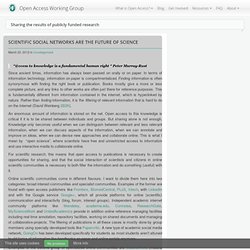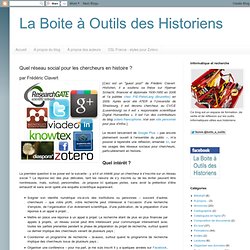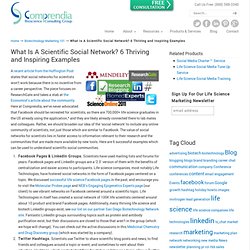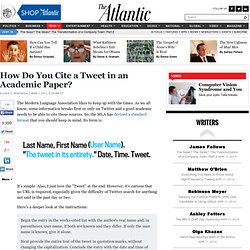

Réseaux sociaux pour les chercheurs - A lire ou à relire. Les réseaux sociaux pour chercheurs: une illusion? Un récent débat autour du libre accès aux données et publications scientifiques et d’un réseau social pour chercheurs [] m’a poussé à me poser une question que j’ai déjà effleurée ici ou là.

Des réseaux sociaux spécifiques aux chercheurs ont-ils une quelconque utilité pour les chercheurs? Qu’apportent-ils de plus que les outils sociaux génériques comme twitter, facebook ou des logiciels avec couche social comme Google Drive, par exemple? Contexte du débat En faisant une simple recherche sur un moteur de recherche, en anglais comme en français, on trouve assez facilement des références sur le sujet.
À THATCamp Paris 2012, une session avait été organisée sur le sujet. Aujourd’hui, il existe un certain nombre de réseaux sociaux pour chercheurs: ResearchGate (RG), MyScienceWork (MSW) ou Academia.edu. Sur les cinq réseaux mentionnés dans le paragraphe précédent, seul Zotero est financé sur fonds publics et développé au sein d’une université []. L’enchevêtrement numérique Le Web 2.0 en interne. Can ResearchGate really be the Facebook of science? — European technology news. Scientific social networks are the future of science.
“@ccess to knowledge is a fundamental human right “ Peter Murray-Rust Since ancient times, information has always been passed on orally or on paper.

In terms of information technology, information on paper is compartmentalized. Finding information is often synonymous with finding the right book or publication. Books mostly give a more or less complete picture, and any links to other works are often just there for reference purposes. This is fundamentally different from information contained in the internet, which is hyperlinked by nature. An enormous amount of information is stored on the net. For scientific research, this means that open access to publications is necessary to create opportunities for sharing, and that the social interaction of scientists and citizens in online scientific communities is necessary to both filter the information and do something (useful) with it. Online scientific communities come in different flavours.
Photos du mur. Scientific social networks are the future of science. Quel réseau social pour les chercheurs en histoire ? Par Frédéric Clavert [Ceci est un "guest post" de Frédéric Clavert.

Historien, il a soutenu sa thèse sur Hjalmar Schacht, financier et diplomate 1930-1950 en 2006 et l’a publiée chez PIE-PeterLang (Bruxelles) en 2009. Après avoir été ATER à l’Université de Strasbourg, il est devenu chercheur, au CVCE (Luxembourg) où il est « responsable scientifique Digital Humanities ». Il est l’un des contributeurs du blog zotero francophone. Twitter for Research by on Prezi. What Is A Scientific Social Network? 6 Thriving and Inspiring Examples. A recent article from the Huffington Post states that social networks for scientists won’t work because there is no incentive from a career perspective.

The piece focuses on ResearchGate and takes a stab at the Economist’s article about the community. Here at Comprendia, we’ve never advocated that Facebook should be recreated for scientists, as there are 700,000+ life science graduates in the US already using the application,* and they are likely already connected there to lab mates and colleagues. Rather, we should broaden our idea of the ‘social network’ to include any online community of scientists, not just those which are similar to Facebook.
The value of social networks for scientists lies in faster access to information relevant to their research and the communities that are made more available by new tools. Here are 6 successful examples which can be used to understand scientific social communities. Facebook Pages & LinkedIn Groups. The unlimited scholarly publication. How Do You Cite a Tweet in an Academic Paper? - Alexis Madrigal - Technology. The Modern Language Association likes to keep up with the times.

As we all know, some information breaks first or only on Twitter and a good academic needs to be able to cite those sources. So, the MLA has devised a standard format that you should keep in mind. Its form is: It's simple. Also, I just love the "Tweet" at the end. Here's a deeper look at the instructions: Begin the entry in the works-cited list with the author's real name and, in parentheses, user name, if both are known and they differ. Via Thomas, Matt (mattthomas). Article: Academic Networking 2.0: Historians and Social Media « INFOdocket. Mark Drapeau: Social Networks for Scientists Won't Work. A "Facebook for Scientists"? It may sound silly, or redundant, but it's becoming more of a reality. Maybe. A new startup based in Germany named ResearchGate has already convinced roughly 1.4 million researchers to become members and begin sharing. On it, you can search your email accounts to find people you know, read PDF documents of research papers, and chat with others about why a particular lab technique isn't working for you.
Reportedly, the service is appealing to young researchers in their 20's. None of this is particularly original. The Economist writes about ResearchGate as if it's the only social network for scientists out there, but that's far from the case. It's not really clear what ResearchGate is doing that's fundamentally different than Labmeeting. It's easy to measure total users or total PDF's uploaded or other metrics and claim some success. This story about Science 2.0 reminds me of a slightly older debate about Intelligence 2.0, whereby the U.S. “Facebook for scientists” Soon after Nature Network launched in 2007 it was being touted as the “Facebook for scientists”. Other sites that had been around longer, such as FriendFeed and LabSpaces, occasionally got that moniker too (and indeed Facebook bought out FriendFeed later on). I view any use of the phrase “Facebook for scientists” with great suspicion.
At least Mendeley (the social and bibliographic management site) has the imagination to call themselves the Last.FM for science. Brian Krueger, at LabSpaces, suggested why none of these sites have become dominant in the way that FaceBook has: ResearchGate’s groups and Job listings appear to be relatively active, Nature Network has its blogs and forum, and LabSpaces has the news and Blogs. Daniel Mietchen agreed with this diagnosis: It’s a small, dedicated group advocating for open science and social networks. So, they still cater to a minority of scientists; to those who enjoy that kind of online interaction for its own sake.
Dr. ResearchGate. Available now: a guide to using Twitter in university research, teaching, and impact activities. Les réseaux sociaux scientifiques : différences d’approches suivant les disciplines. Academia.edu - Share research.